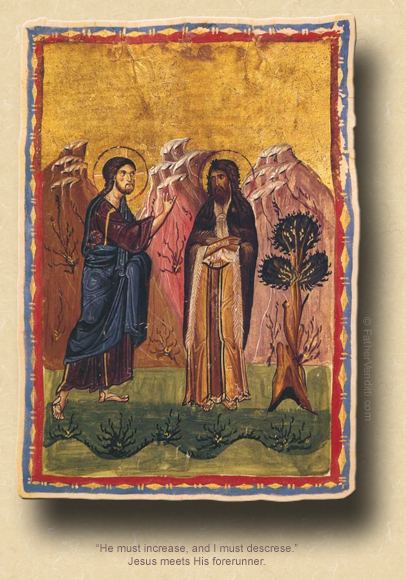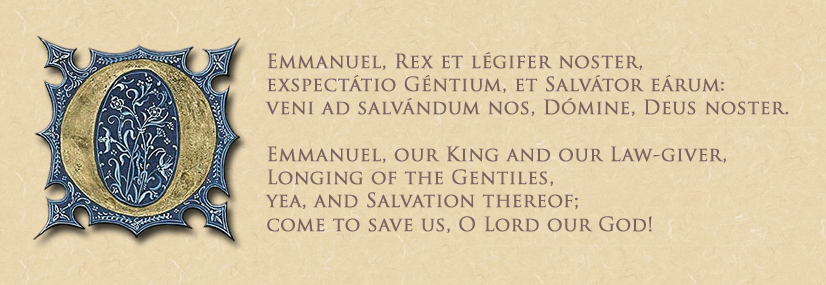What's In a Name?
The Seventh Day of the Greater Antiphons.*
Lessons from the primary feria, according to the ordinary form of the Roman Rite:
• Malachi 3: 1-4, 23-24.
• Psalm 25: 4-5, 8-10, 14.
• Luke 1: 57-66.
Lessons from the dominica,** according to the extraordinary form of the Roman Rite:
• I Corinthians 4: 1-5.
• Psalm 144: 18, 21.
• Luke 3: 1-6.
FatherVenditti.com
|
 6:07 PM 12/23/2019 — My family is one of those in which every child born has to be named after someone else: I was named after my father and my father was named after his father; my older sister was named after my mother, who was named after her mother; since I have no son of my own, my younger sister's son is named after me, and so forth. This custom was very strictly adhered to in the Palestine of our Lord's time, and figures prominently in the story of the birth of the Baptist. 6:07 PM 12/23/2019 — My family is one of those in which every child born has to be named after someone else: I was named after my father and my father was named after his father; my older sister was named after my mother, who was named after her mother; since I have no son of my own, my younger sister's son is named after me, and so forth. This custom was very strictly adhered to in the Palestine of our Lord's time, and figures prominently in the story of the birth of the Baptist.
And that story is very familiar to us: the Angel Gabriel sent to Zechariah; Zechariah doubting Gabriel's message and suffering the loss of his voice as a consequence; the birth of the Baptist by the once-thought-barren Elizabeth; the objections of their neighbors that none of their relatives has the name “John,” and the insistence of Zechariah that he be given that name anyway, after which his voice is restored by God. I have to confess that I don't understand Saint Luke's claim that they had to communicate with Zechariah with signs, since the angel Grabriel punished him with dumbness, not deafness. I noticed that because I'm deaf one side. And today's Gospel lesson ends with the climactic statement that “What, then, will this child be? For surely the hand of the Lord was with him” (Luke 1: 66 RM3).
Exactly when the Baptist was born is unknown, but the feast which celebrates his birth, which we observed six months ago, was chosen in the fourth century because it is exactly six months before the birth of our Lord; and, Saint Augustine, at that time, remarked how appropriate it was that the date for the feast is so close to the summer solstice, since it's on that day that the daylight hours begin to grow shorter, whereas the celebration of our Lord's birth at Christmas occurs winter solstice, after which the days begin to grow longer, which he says is consistent with the remark made by John the Baptist in John's Gospel wherein, upon being told that Jesus has begun to baptize as he was, he says, “He must increase; I must decrease” (John 3: 30 NABRE), which, when you think about it, is the quintessential statement of the interior life for the Christian: our goal should be to reproduce in ourselves the life of Christ so perfectly that we ourselves begin to disappear and Christ begins to show through us in perfect purity.
That, of course, is an ideal rarely obtained except by the saints. Some of you, I'm sure, are familiar with the life of the Little Flower; her “little way,” as she called it, was really nothing more than this spiritual principle so simply and perfectly expressed by the Baptist in John's Gospel: “He must increase; I must decrease.” But, as I said, it's a rather lofty spiritual goal, and with all the pragmatic concerns we have to deal with every day—especially this time of year—it's very difficult to even think of achieving this lofty goal—unless of course, we're going to follow the lead of the Desert Fathers and retreat into a hermitage somewhere to live out our lives, but that is not the choice that any of us have made.
But there is a way that we can actually do this to a degree, and it was very simply and beautifully put by a Saint Josemaría Escrivá. He said that, for those of us in the world, whether we be lay people or priests, it is enough to strive for the goal that, when others see us act or hear us speak, they would be able to say, “That person has read the life of Jesus Christ.”
So, on this day so close to the celebration of our Lord’s birth, I would like to recommend—and particularly at the moment when we receive our Blessed Lord in Holy Communion—that we ask our Lord for the grace to decrease ourselves so that He may increase within us.

* The Greater Antiphons sung at Vespers, known as the "O Antiphons," and also serving as the verse before the Gospel in the ordinary form, are ordered and utilized differently between the two forms of the Roman Rite. The banners at the top of the pages for the Days of the Greater Antiphons have been created to reflect the original ordering of the antiphons as used in the extraordinary form. For reference, the usages of the two forms compare thus:
| Date: |
Extraordinary Form: |
Ordinary Form: |
| Dec. 17. |
O Sapientia. |
O Sapientia. |
| Dec. 18. |
O Adonai. |
O Adonai. |
| Dec. 19. |
O Radix Iesse. |
O Radix Iesse. |
| Dec. 20. |
O Clavis David. |
O Clavis David. |
| Dec. 21. |
O Oriens. |
O Emmanuel. |
| Dec. 22. |
O Rex Gentium. |
O Rex Gentium. |
| Dec. 23. |
O Emmanuel. |
O Rex Gentium. |
| Dec. 24. |
[The Vigil of Christmas.] |
O Oriens. |
Regarding December 24th: in the Roman Rite, the concept of a vigil differs completely between the ordinary and extraordinary forms. In the ordinary form, a vigil is simply a celebration of the feast the evening before, either prior to or following First Vespers (in the United States, after 4:00 PM). On Solemnities on which an obligation has been attached, this may be fulfilled at either the Mass of the vigil the evening before, or on the feast itself.
In the extraordinary form, the word “vigil” designates the entire day before a First Class Feast, and the Mass for the vigil takes place in the morning. If a feast carries an obligation, this must be satisfied on the feast itself; the extraordinary form does not offer the opportunity to satisfy an obligation on the evening before.
In the extraordinary form, December 24th is the Vigil Day of Christmas and has its own proper texts, the Days of the Greater Antiphons having concluded on the 23rd. In the ordinary form, the morning of December 24th is a day of the Greater Antiphons up to Vespers, at which point it becomes the vigil for Christmas.
** In the extraordinary form, the days of the Greater Antiphons do not have specific lessons assigned to them as they do in the ordinary form, with the lessons taken from the previous Sunday as usual; the exception will be when a Day of the Greater Antiphons occurs on an Ember Day, which do have lessons assigned to them.
|

